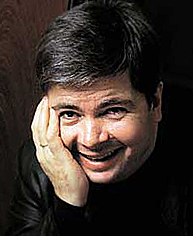This is an old revision of this page, as edited by Russavia (talk | contribs) at 12:20, 2 November 2008 (Reverted to revision 248992049 by Russavia. using TW). The present address (URL) is a permanent link to this revision, which may differ significantly from the current revision.
Revision as of 12:20, 2 November 2008 by Russavia (talk | contribs) (Reverted to revision 248992049 by Russavia. using TW)(diff) ← Previous revision | Latest revision (diff) | Newer revision → (diff)
Artyom Borovik (September 13, 1960 – March 9, 2000) was a prominent Russian journalist and media magnate. He was the son of a Soviet-era journalist, Genrikh Borovik, who worked for many years as a foreign correspondent in the U.S.
Journalism
Artyom Borovik was a pioneer of investigative journalism in the Soviet Union during the beginning of glasnost. He worked for the American CBS program 60 Minutes during the 1990s, and began publishing his own monthly investigative newspaper Top Secret, which grew into a mass-media company involved in book publishing and television production. In 1999, Borovik started an investigative program called Versiya in partnership with U.S. News & World Report.
His Top Secret TV programme often focused on corruption cases involving Russia's political and economic elite. The programme, as well as Borovik's print publications, Top Secret and Versiya, were openly critical of Vladimir Putin. Artyom Borovik also opposed the Chechen Wars. His last investigation was about the Russian apartment bombings of 1999, which he and others alleged had actually been orchestrated by the Russian FSB . In one of his last papers he quoted Vladimir Putin who said: "There are three ways to influence people: blackmail, vodka, and the threat to kill."
Death
Borovik died in an aircraft crash at Sheremetyevo International Airport on 9 March 2000. The Yakovlev Yak-40 which was owned by Vologda Air Enterprise, and operated for the Russian business charter airline, Aerotex, was chartered by the Chechen oil industry executive Ziya Bazhayev for a flight to Kiev. In the hours after the crash, there was speculation the crash may have been related to Borovik being on board the aircraft and his writing about the Moscow apartment bombings. . Yuri Felshtinsky and Vladimir Pribylovsky speculated that Borovik was assassinated due to his publications about Vladimir Putin during the 2000 Russian presidential elections.
The official investigation into the crash by the Interstate Aviation Committee revealed whilst snow was removed from the aircraft exterior, de-icing fluid was not applied. The aircraft was due to depart at 8:00am in the morning of 9 March 2000, however, due to Borovik's planned flight being delayed, Bazhayev offered Borovik a seat on the aircraft and the crew requested permission to start the engines at 8:28am. The crew did not ask for permission to enter the taxiway, which was done at too high a speed for the icy conditions, and the flaps were set to 11°, instead of 20°. The aircraft reached a speed of 165km/h, when the crew began to rotate the aircraft, at which stage it reached a 13° angle of attack, and stalled 8-10 metres off the ground, and reached a height of 63 metres, before crashing. All 9 people on board, including 5 crew, perished in the crash.
Artyom Borovik is buried at Novodevichy Cemetery in Moscow.
His prize awarded to Anna Politkovskaya
An Artyom Borovik prize for investigative journalism is awarded annually in Moscow. Anna Politkovskaya received this prize.
His books
Borovik published several books, including The Hidden War, about the Soviet war in Afghanistan.
- Artyom Borovik. Russian in the U. S. Army. Hippocrene Books, Inc. 1990. ISBN 0-87052-627-8
- Artyom Borovik. Hidden War: A Russian Journalist's Account of the Soviet War in Afghanistan. Grove/Atlantic, Inc. 1992. ISBN 0-87113-283-4
References
- Yuri Felshtinsky and Vladimir Pribylovsky The Age of Assassins. The Rise and Rise of Vladimir Putin, Gibson Square Books, London, 2008, ISBN 190-614207-6, pages 116-121.